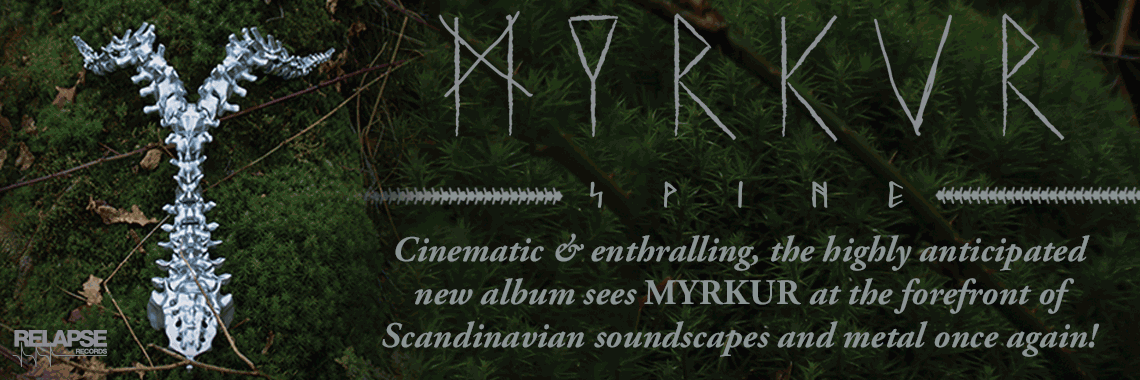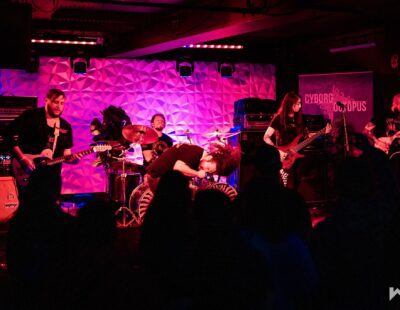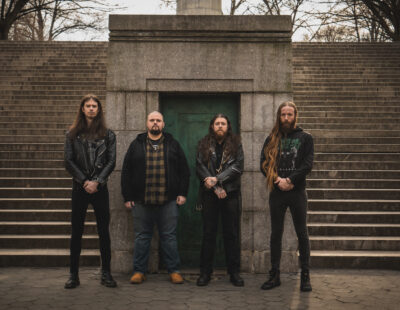Guitarist and vocalist Joe Wood is best known for his time in T.S.O.L., including the classic Change Today? album – a hybrid of punk and blues that I consider one of the best Southern California punk albums in the early-to-mid 80s. The album’s highlight is “Flowers By The Door,” a near-perfect song that is still moving and powerful decades later. Wood also appeared on the underappreciated Revenge album (a song was featured in the cult classic The Return Of The Living Dead). T.S.O.L. later ventured into glam metal, which divided fans but led to two records Wood still loves (more on that later).
T.S.O.L. eventually reunited with original vocalist Jack Grisham and Wood returned to blues, working day gigs to support his family and fund his passion. Wood is an example of creating a life in music and the journeyman’s road in both underground music and blues. Since returning to blues he’s opened for B.B. King and other legends and fronts his band Joe Wood And The Lonely Ones. He also started painting blues legends; his artwork has been featured in local showcases. Wood, who still lives in Southern California, talked to us about his career and writing the perfect song. I was pleased to learn he owns a deck of Robert Crumb’s Heroes Of The Blues trading cards.
How did you get into blues?
I had an uncle who was a convict. He would get out of prison and visit my family. He gave me a guitar and told me to learn to play the blues. I wanted to learn to play the guitar and he said blues is where I should start. That’s when I was 16 or 17. I got a later start. The T.S.O.L. thing was kind of a fluke. They were like “do you want to go on tour” and I was pretty much homeless, so I did what I had to do.
What blues records did you learn from?
The first was Lightnin Hopkins. I started studying blues really heavily after touring. I wanted to be in a great roadhouse blues band. For me, it all starts with Jim Morrison and The Doors. Morrison was just doing blues songs, basically. I love writing and poetry and I’m a big reader. The Doors didn’t do the typical I-IV-V blues; they did rock songs with a blues tone. I studied The Doors and then went to Lightnin Hopkins, but I wasn’t good enough to play it. So I went to Buddy Guy and John Lee Hooker, would study another guy for a few months, then move on.
Most people who get into blues start with rock and work their way back. It sounds like you did the opposite.
That’s correct. Look at the Change Today? record. The sounds, songs and melodic tone all come from implementing the blues into the T.S.O.L. sound. That’s what changed everything. If you throw blues into punk rock you come up with classic rock, almost (laughs).
What have you been up to since you left T.S.O.L.?
I’ve been writing and recording songs as fast as I can, which isn’t that fast (laughs). I did a solo recording and then I decided to go back to blues. I was doing blues when I was hired for T.S.O.L. (Guitarist) Ron Emory started playing with my band which is how I got the job. They broke up when (vocalist) Jack (Grisham) wanted to do Cathedral Of Tears. I’d already done the punk thing, y’know. So I decided to go blues at 22. It’s always been my music even if I loved punk. Ron started sitting in with my band and (bassist) Mike Roche started coming to the shows. We were going to start a new band and the manager said let’s call it T.S.O.L. That’s how that happened – either a mistake or the greatest thing I’ve ever done.
I’m a big fan of the early T.S.O.L. records but it seems like there was an emphasis on Change Today? on musicality and songcraft. “Blackmagic” and “Flowers By The Door” are unforgettable.
Ron and I were a great team. As far as “Flowers By The Door” — I wrote that by myself but he wrote the hook. On “Blackmagic” he wrote the music and I wrote the words. It was such a good partnership. We wanted to be great musicians. When I started in the band we wanted to make good, melodic music. I didn’t care at that point what anyone else liked. And I paid the price for two years: getting in fights and getting bottles thrown at me and having people yell “Code Blue,” which they still do to this day. We eventually became our own band and it was great, but drugs became a huge problem. This was when record companies were really big. They had a lot to do with the direction of Hit And Run and Strange Love. There was just touring, touring, touring.
Did it hurt you when people said things like ‘the new T.S.O.L.?’
I’m going to be honest with you. I moved away from home when I was 13. I was on the road with a rock band. I didn’t give a shit what anyone said. I was having a ball. It was a great time to be in a band, right before the Seattle thing. It was great times. Yeah, on Hit And Run and Strange Love we had makeup artists and rock star stuff. The punk rockers didn’t like that but I was just a musician. The drugs kind of took over my life. It’s funny; I never wore my hair big except for those photos.
Do you think a lot of people who were critical didn’t know what it’s like to make a living as a musician?
That’s the thing. In 1978 I was at The Masque the first time The Germs played. There were no fans when I started. The fans were in bands. I always went my own way and did what I wanted to do. I love Hit and Run and I think there are great songs on Strange Love. Guns N’ Roses opened for us and then we opened for them. When you are listening to music and involved in music you change. I get bored very quickly. I like to experiment. That’s not commercial. People want to hear what they are used to. When you go see The Rolling Stones you want to hear “Time Is On My Side,” not the new stuff.
What struck me about Change Today? is that the themes are blues themes. “Blackmagic” has the occult and love tied together. On “Red Shadows,” there’s the sensation of being followed…
It’s all blues. We’re talking about the things that move you and turn your life upside down. Women are the most powerful thing in the world. Look all the way back to Samson. Sometimes, I wrote so much, if it sounded good I’d let people come up with their own meanings. I’ve heard so many interpretations of our song “John.”
I’m spontaneous. With the band I have now we don’t rehearse. We just do it. I like to get into a hypnotic beat that begins and ends with the drums – they are instilled in everyone. A lot of people didn’t get my stuff. It means a lot to me when people ask me about what I was trying to do.I love simplicity in music like Joe Cocker. I like saying what you need to say. I hate progressive rock with a passion. It always confused me and got me down. Right when you are getting to like it they change.
What are some of the reactions you’ve heard over the years to “Flowers By The Door”? I think it’s your best song.
It was the biggest song we ever had because it got put on a ABC school special about teenage suicide. It ran throughout the show. I had one guy camp out on my front lawn for a few weeks. He was a troubled kid. To this day his family writes letters saying that song saved his life. I don’t want any more than that, man. I wrote the song in ten minutes sitting on a back porch.
Is the front cover of Change Today? a Tarot deck?
It is. Ron came up with that cover. It looked great.
Do you think in retrospect the image speaks to the themes of that record: fate, chance, destiny…
Blues is always singing about sex and death and a little in between.
After T.S.O.L. ended how did you find your way back to blues?
I don’t have a pension. Blues guys can play till they are 80. This is what I’m going to do. I’m not going to become a welder or a lawyer. Once I got back into it I decided to be the best blues musician and singer I could be. I’m not a natural like my son who plays drums. I would play gigs but I also sat in my garage for five years practicing. It was also one gig a week for about three years at a blues joint.
What was the hardest thing to learn after being on the road with a successful band?
Well, money, for one. I had to work during the day and play at night for many years. I didn’t want to beat a dead horse and continue to play T.S.O.L. I couldn’t make it better than it was at its peak. Once you lose members the chemistry changes. So, I did just about everything from laying brick to roofing. My big thing was a gig doing show power for big outdoor events, things like Madonna. I never did the touring stuff but I laid cable and worked my way into a manager position. I did that until I fell and crushed my back and needed a bunch of surgeries.
Since you were successful with T.S.O.L. was it hard to go back to regular work?
It was, but I had a baby boy. It wasn’t about me anymore. It was about him. If your passion is music and you want to have kids and you aren’t getting huge royalty checks you better be able to work (laughs).
A lot of blues artists have day jobs.
They weren’t living like kings; they were gigging five nights a week in juke joints. I knew my road was going to be hard. But I couldn’t keep playing “Blackmagic.” Once in a while I’d go to Brazil and do (T.S.O.L.) sets because I could play for 25,000 people singing all the words in all my songs because my records were the only ones released in South America at that time and the payday was huge. I didn’t mind doing those sets. I’ll still play “Flowers By The Door” at my little blues gigs. I don’t turn my back on it. But I can’t be the 24-year-old Joe Wood. I’m 53 now. The songs that I sing now, I think, are just as important.
What’s the difference between gigging to a small crowd versus a massive audience?
Small gigs are always better. With big gigs it’s much harder to connect. I also don’t like playing outdoors. I like small, dark places. I think my ultimate thing would be playing 500-seat capacity places with good lighting, so everyone gets into the show and performance.
Do you want to play for the rest of your life?
Yes. I kind of have to. It’s not a financial thing. It’s just become part of who I am. That’s why B.B. King does it. He doesn’t do it because he needs the money. Believe me, if I didn’t have to do this, if it wasn’t ingrained in me, it would be really easy to just relax. It’s just who I am.
—
Get in touch with Joe Wood on Facebook
Visit Joe Wood’s website for gig and artwork information
—
Read Blues Into Metal 1: Jason Ricci
Read Blues Into Metal 2: Up Jumped The Devil (with Adam Gussow)






